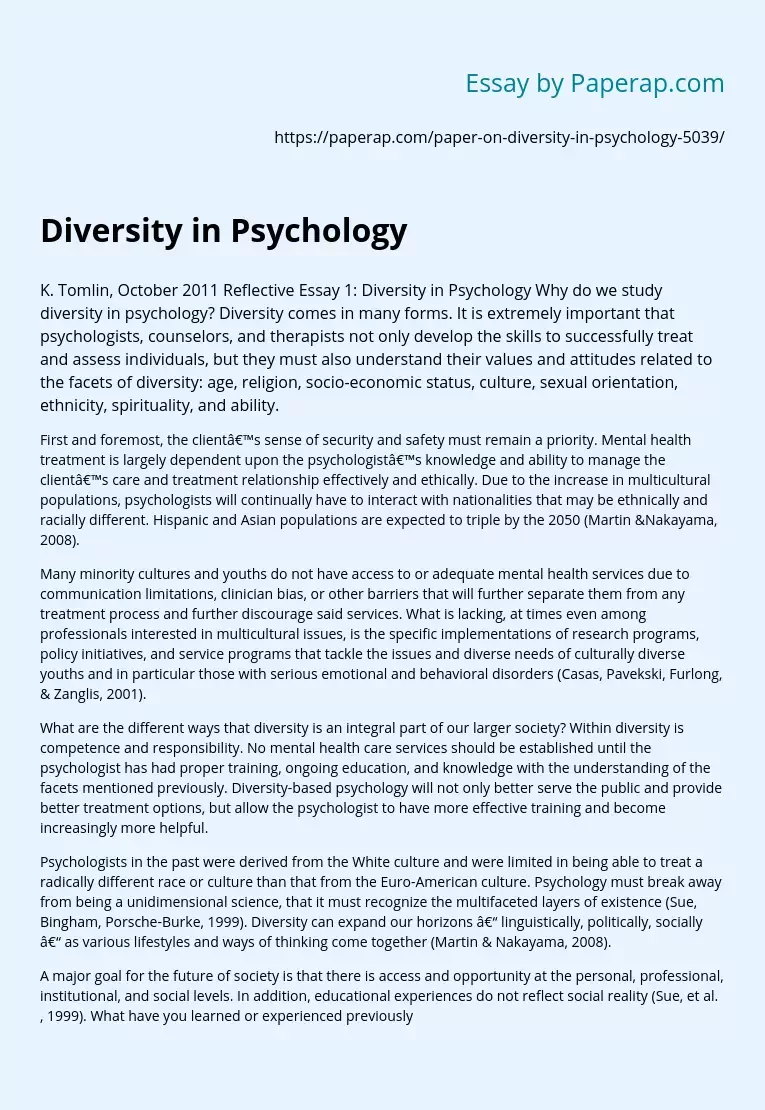Diversity in Psychology
K. Tomlin, October 2011 Reflective Essay 1: Diversity in Psychology Why do we study diversity in psychology? Diversity comes in many forms. It is extremely important that psychologists, counselors, and therapists not only develop the skills to successfully treat and assess individuals, but they must also understand their values and attitudes related to the facets of diversity: age, religion, socio-economic status, culture, sexual orientation, ethnicity, spirituality, and ability.
First and foremost, the client’s sense of security and safety must remain a priority.
Mental health treatment is largely dependent upon the psychologist’s knowledge and ability to manage the client’s care and treatment relationship effectively and ethically. Due to the increase in multicultural populations, psychologists will continually have to interact with nationalities that may be ethnically and racially different. Hispanic and Asian populations are expected to triple by the 2050 (Martin &Nakayama, 2008).
Many minority cultures and youths do not have access to or adequate mental health services due to communication limitations, clinician bias, or other barriers that will further separate them from any treatment process and further discourage said services.
What is lacking, at times even among professionals interested in multicultural issues, is the specific implementations of research programs, policy initiatives, and service programs that tackle the issues and diverse needs of culturally diverse youths and in particular those with serious emotional and behavioral disorders (Casas, Pavekski, Furlong, & Zanglis, 2001).
What are the different ways that diversity is an integral part of our larger society? Within diversity is competence and responsibility. No mental health care services should be established until the psychologist has had proper training, ongoing education, and knowledge with the understanding of the facets mentioned previously.
Diversity-based psychology will not only better serve the public and provide better treatment options, but allow the psychologist to have more effective training and become increasingly more helpful.
Psychologists in the past were derived from the White culture and were limited in being able to treat a radically different race or culture than that from the Euro-American culture. Psychology must break away from being a unidimensional science, that it must recognize the multifaceted layers of existence (Sue, Bingham, Porsche-Burke, 1999). Diversity can expand our horizons – linguistically, politically, socially – as various lifestyles and ways of thinking come together (Martin & Nakayama, 2008).
A major goal for the future of society is that there is access and opportunity at the personal, professional, institutional, and social levels. In addition, educational experiences do not reflect social reality (Sue, et al. , 1999). What have you learned or experienced previously that may influence your learning or attitude about this course? After reading Experiencing Intercultural Communication (Martin & Nakayama, 2008), I gathered a tremendous amount of information pertaining to immigration in regard to the European influence on “Americans” and how culture was practically depleted with the onset of the first peoples.
The United States still has a very far way to go before culture is actually a positive force on society. The majority becoming a minority and the minority becoming a majority will a very new experience for me, but I believe it will be a very positive one now that I have a better understanding of diversity and the population shifts. My attitude toward other cultures is a lot more sensitized, especially after living as a white minority in a pacific island for four years.
I have a much greater appreciation for the needs of others and how I can communicate and relate to them. I believe this class will further teach and guide me in the diversity of psychology, the diversity of culture, and the importance of how my future psychology career will impact those I treat. References Casas, J. M. , Pavelski, R. , Furlong, M. J. , & Zanglis, I. (2001). Advent of systems of care: Practice and research perspectives and policy implications.
In J. F. Ponterotto, J. M. Casas, L. A. Suzuki & C. M. Alexander (Eds. ) Handbook of multicultural counseling (2nd ed. ). Sage. Martin, J. & Nakayama, T. (2008). Demographic imperative. Experiencing intercultural communication (3rd ed. , pp. 10-14). New York: McGraw-Hill. Sue, D. W. , Bingham, R. , & Porsche-Burke, L. (1999). The diversification of psychology: a multicultural revolution. American Psychologist, 54(12), 1061-1069.
Diversity in Psychology. (2018, Feb 02). Retrieved from https://paperap.com/paper-on-diversity-in-psychology-5039/

